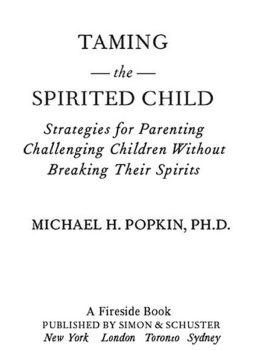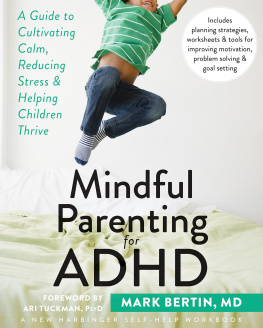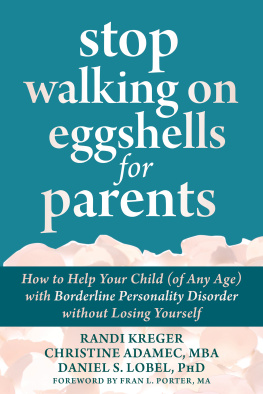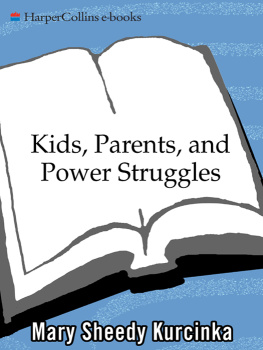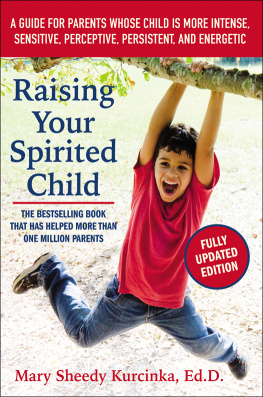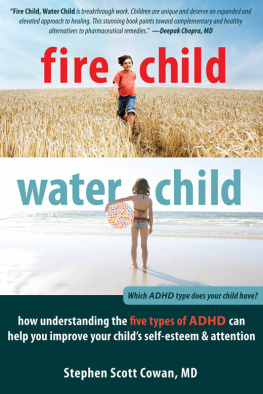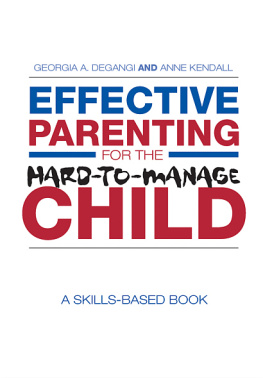Taming the Spirited Child reminds us of the importance of always working to strike the right balancewhich is different for each and every childbetween empathy, love, expectation, and limits as we go about our work as parents and teachers.
WILLIAM S. PEEBLES, IV, Headmaster,
The Lovett School, Atlanta, Georgia
A wonderful, heartwarming book for any parent who has ever wanted to throw up her hands in despair over her childs repeated misbehavior. This book not only gives them hope; it gives them answers!
BETTIE B. YOUNGS,author,
Taste Berries for Teens
This is a book that needed to be written! Dr. Michael Popkin has done a wonderful job in providing a resource that will help those millions of parents of spirited children live happier, more satisfying family lives while giving their children the gift of love and limits.
ROBYN FREEDMAN SPIZMAN, author,
The Thank You Book

Also by Michael H. Popkin
PARENTING PROGRAMS
(full curriculums that include a parent guide, leaders guide, and video)
Active Parenting Now: For Parents of Children Ages 5 to 12
Active Parenting of Teens
1, 2, 3, 4 Parents! Parenting Children Ages 1-to-4 (with Marilyn Montgomery and Betsy Gard)
Parents on Board: Building Academic Success Through Parent Involvement (with Bettie B. Youngs and Jane M. Healy)
Free the Horses: A Self-Esteem Adventure (with Susan D.Greathead)
Active Teaching: Enhancing Discipline, Self-Esteem and Student Performance
Windows: Healing and Helping Through Loss (with Mary J.Hannaford)
BOOKS
DocPops 52 Weeks of Active Parenting
Getting Through to Your Kids (with Robyn Freedman Spitzer) Active Parenting: Teaching Cooperation, Courage, and Responsibility
Quality Parenting (with Linda Albert)
SoWhy Arent You Perfect Yet?
For more information about these and other resources or to find a parenting class near you go to: www.activeparenting.com.

Copyright 2007 by Michael H. Popkin, Ph.D.
All rights reserved, including the right of reproduction in whole or in part in any form.
FIRESIDE and colophon are registered trademarks of Simon & Schuster, Inc.
Designed by Mary Austin Speaker
ISBN-10: 1-4165-3924-7
ISBN-13: 978-1-4165-3924-7
Visit us on the World Wide Web:
http://www.SimonSays.com
To my wife, Melody, my parenting partner,
and our children, Megan and Ben
Contents
Do You Have a Spirited Child?
The Spirit of the Child
Taming Versus Breaking
The Tamer as Friend
The Dynamics of Power
Discipline: Showdown at the OK Corral
Advanced Discipline: Heading Them Off at the Pass
FLAC: The Ultimate Discipline Tool
A Lump of Sugar Called Encouragement
Anger, Tantrums, and the Rustling of Reason
Palms Up, Pardner
Using Outside Resources: Calling in the Cavalry
Beyond Taming: Free the Horses
Meanwhile, Back at the Corral: Your Taming Plan in Action

Introduction
I am so unhappy. I cannot play with you, the fox said. I am not tamed.
Ah! Please excuse me, said the little prince. But, after some thought, he added: What does that mean, tame?
It is an act too often neglected, said the fox. It means to establish tiesTo me, you are still nothing more than a little boy like a hundred thousand other little boys. And I have no need of you. And you, on your part, have no need of me. To you, I am nothing more than a fox like a hundred thousand other foxes. But if you tame me, then we shall need each other. To me, you shall be unique in all the world. To you, I shall be unique in all the world.
THE LITTLE PRINCE,
by Antoine de Saint-Exupry
THE RELATIONSHIP BETWEEN parent and child is, ideally, one characterized by a special bond of love in which each person is unique and special in all the world to the other. Unfortunately, in my thirty years of working with parents and children, I have found anger; fighting and resentment too often characterize this relationship, with each person attempting to exercise his or her will over the other. These classic power struggles are present from time to time in almost all families and occur with disturbing frequency in more families than ever before. In one survey of parents enrolled in a six-session course for parents of elementary-age children, 75 percent said they were there because of such power struggles.
During three recent guest appearances on The Montel Williams Show, I was asked to evaluate and offer advice to a number of families that were having trouble with their children. In each case a power struggle was evident; but what was unique about these children was their sensitivity to outside triggers (whether it was a parental request or a scratchy shirt) and the intensity of their reactions. For example, one two-year-old child had already been having a violent tantrum for over an hour when Montels audience saw his expression of rage at his father for trying to get him to take off his shirt before taking a bath. It was a difficult scene to watch, but it was painfully familiar to many members of the audience. Tantrums that last for hours over seemingly inconsequential matters seem to have become part of the everyday experience of many families.
In recent years, such tantrum-prone kids have been labeled difficult, strong-willed, and defiant. More recent, they have also been called quirky and even spirited. They are often intense, hypersensitive, persistent, distractible, and unwilling to accept change. Butlike the spirited horse Seabiscuit, in the book and movie of the same nameonce tamed, they can not only become successful, but champions.
While the term taming may suggest whips and chains to some, the real key to taming a spirited child is to establish a relationship. This is the taming that the fox spoke of to the Little Prince in Antoine de Saint-Exuprys classic childrens story. When coupled with effective methods of discipline, communication, and encouragement, relationship-building skills can be used to help a child learn to live more effectively in the family and in the world. As one mother put it after learning these skills and experiencing a positive change in her spirited son, The best part to me was the reawakening of the feeling of joy for my child.
1
Do You Have a Spirited Child?
I would rather be ashes than dust! I would rather that my spark should burn out in a brilliant blaze than it should be stifled by dry rot. I would rather be a superb meteor, every atom of me in magnificent glow, than a sleepy and permanent planet. The proper function of man is to live, not to exist. I shall not waste my days in trying to prolong them. I shall use my time.
JACK LONDON (18761916)
JACK LONDON, A talented and popular writer of adventure tales, including Call of the Wild, the story of a sled dog in Alaska, spent his adult life writing, championing social causes, and struggling for peace of mind. London was probably once a spirited child, the kind of child that prompted the late humorist Sam Levenson to quip that insanity is hereditaryyou get it from your children. If you have a child who is driving you crazy, chances are that you are grimacing rather than laughing right now. Ill also wager that you find yourself angry a lot. You may feel like one mother who confided to me recently, I never even knew I could get angry until I had Alex! Some kids just seem to know how to push our buttons in ways we never dreamed possible.

